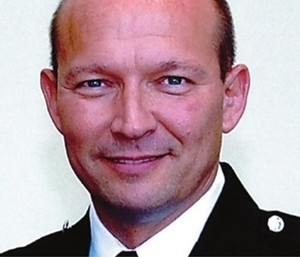Greensboro Police Chief Responds to Surveillance Questions

Police Chief Ken Miller explained police surveillance of activists, addressed some public concerns, maintained that the department didn’t have an undercover officer in Occupy Greensboro and welcomed an investigation into whether documents were falsified if the council requested one last week.
“No officers ‘infiltrated,’ if you will, the group,” Miller said. “We didn’t become part of Occupy Greensboro. The work that Rob Finch was doing, he was in an undercover vehicle observing the group from a distance and talking to people in the group.”
In an Oct. 16, 2011 e-mail, Finch wrote that Occupy Greensboro was meeting at Festival Park and planning to protest by Bank of America the following day near the route President Obama’s motorcade would be passing.
“At the meeting right now, I’m trying to push the idea that Occupy should concentrate their efforts on the park/YWCA and forget BofA,” Finch wrote. “Hopefully, that will be successful. More info to follow as it comes in.”
The message was forwarded to Miller, who passed it on to the US Secret Service to coordinate security for the event.
Miller maintains that Finch was pushing indirectly through Occupy participants to skip the Bank of America protest or to move further from route “so they didn’t run any risk of getting jammed up with Secret Service or the motorcade.”
Mo Kessler, an Occupy Greensboro participant, told YES! Weekly that she remembers Finch approaching her early on at the group’s encampment before a meeting. She said he wore a fleece jacket, didn’t give his name and didn’t identify himself as an officer, but did ask her several questions about herself. Kessler said she did not remember if Finch participated in meetings.
Miller told a different story. “The assurance I have from my staff is we [did] not infiltrated in any meeting,” Miller said. “[Finch] was working through a person in the meeting. That’s why the other people who were part of that group couldn’t recognize him because he was never in the meeting.
“I remember asking [Finch] one time, ‘Are you in this group?’ and he said, ‘No, I’m not in this group,’” Miller said. “There was more than one person who was com municating with us from the group. Not in a mean way, not to undermine the group, but to ensure public safety, which was our only goal.”
Several Occupy participants said the group decided to communicate openly with police about some of its plans, and Miller said Assistant Chief Anita Holder addressed a meeting at Glenwood Coffee & Books.
Police directed all questions on the issue to Miller and would not allow Finch to comment.
The chief said he would not comment about “who is or isn’t an informant, or why.” Capt. Mike Richey called Councilwoman Marikay Abuzuaiter a confidential informant in an e-mail to other officers. E-mails obtained in a public-information request include numerous messages exchanged between Finch, a criminal intelligence officer, and Abuzuaiter both before and after her election to council. Miller would not comment about whether the two interacted, but Abuzuaiter denied knowing Finch or corresponding with him, disavowing direct e-mails that included forwarded protest plans and two photographs of a protest map for a march in Charlotte.
Miller said a “good number” of the thousands of e-mails released to YES! Weekly in numerous public-information requests related to police surveillance should not have been released, but said it would be “unacceptable behavior” if someone in the department altered e-mail files in the request.
“We’re not in the business of doctoring e-mails or any other records or fabricating evidence of any kind,” he said. “The records were not seen by police. We did not know they were being delivered publicly. Had we even known that they were being released we would have prevented their release anyway so there is no motivation on our part to doctor anything. I simply don’t think there’s anything of that or it’s true in any respect, shape or form.”
Miller said he would readily comply with a request for an investigation.
“It would require direction of the council or the manager and we would be happy to provide those [documents] either to the Secret Service or the State Bureau of Investigation and they could do their forensic analysis on those e-mails,” he said. “I have no objection if we’re directed by the council or the manager.”
City Attorney Mujeeb Shah-Khan and the chief indicated they were both unsure about exactly how the city found out that YES! Weekly planned to run an article about police surveillance of activists in late January, but Miller said he believed it was from someone who had spoken to this reporter. Abuzuaiter, who was interviewed prior to the article’s publication, said she did not tell the city or police department about the article or its contents. Miller said the article only became a concern when staff realized that police didn’t review most of the public-information requests before they were released. City staff is still trying to determine why the requests did not go through the proper channels.
Some residents, including NC A&T University professor Michael Roberto, said police surveillance of people expressing their First Amendment rights requires investigation by council.
“Some people have taken issue with the term ‘criminal intelligence,’” Miller said. “It’s just the name of the unit. It’s mostly semantics. It’s a standard term used in police departments. Intelligence isn’t all criminal but it helps us keep tabs with what may be creating risk for our community.”
Miller said the department isn’t interested in “thwarting people’s First Amendment right to speech,” but said he doesn’t understand why anyone would be surprised that the department is keeping tabs on activist groups or the pulse of the city.
“If we have gatherings of activist groups in our community we tend to want to know about them because activist groups more often than not here act peacefully but don’t always act peacefully,” he said. “There are examples all around the country where there have been problems. There have been examples here where there’s been problems over the years.”

